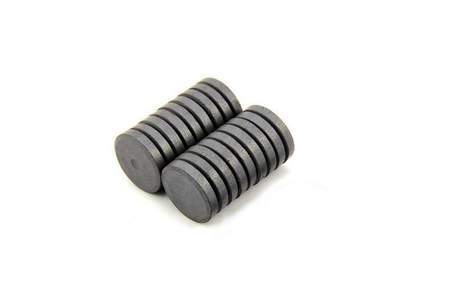Ferrite magnets
Ferrite magnets (ceramic magnets) are permanent magnets. Currently, these are the most frequently used magnets. They especially stand out for their low price. Compared to neodymium magnets, ferrite magnets are weaker, but their strength is sufficient for a large number of applications. They are often encountered, e. g. in offices.
There are two basic types of ferrite magnets:
- Isotropic ferrite magnets are weaker and cheaper - produced by pressing
- Anisotropic ferrite magnets are thicker - produced by injection molding
The maximum working temperature of ferrite (ceramic) magnets amounts to 250°C.
Ferrite magnets have many advantages:
- Low cost
Is one of the biggest advantages of ferrite magnets. They are affordable magnetic materials. It makes them attractive for applications where material cost is a key factor. - Corrosion resistance
Ferrite magnets are corrosion resistant, i.e. no surface treatment is required. This feature is useful for outdoor applications as well as in humid environments. - Long lifetime
If used properly, ferrite magnets have a long operating life and can provide consistent magnetic performance for many years. - Magnetization stability
Ferrite magnets tend to maintain their magnetic force without the influence of an external magnetic field. This means that they do not tend to demagnetize themselves or lose their strength easily. - Easy availability
Ferrite magnets are commonly available on the market.
It is important to note that ferrite magnets have their limitations, especially in terms of their magnetic strength. They are much less strong than some other types of permanent magnets such as neodymium or SmCo magnets. They are, therefore, ideal for applications where extremely strong magnetic fields are not required and where cost and corrosion resistance are important factors.
Comparison of different types of permanent magnets
A basic comparison of the different types of permanent magnets can be found in the table as follows.
| Magnet type | Holding force | Temperature resistance | Price | Chemical resistance | Corrosion resistance |
|---|---|---|---|---|---|
| Ferrite magnet | 250 °C | ||||
| Neodymium NdFeB magnet | 80 - 230 °C | ||||
| Samarium SmCo magnet | 350 °C | ||||
| AlNiCo magnet | 450 °C |

